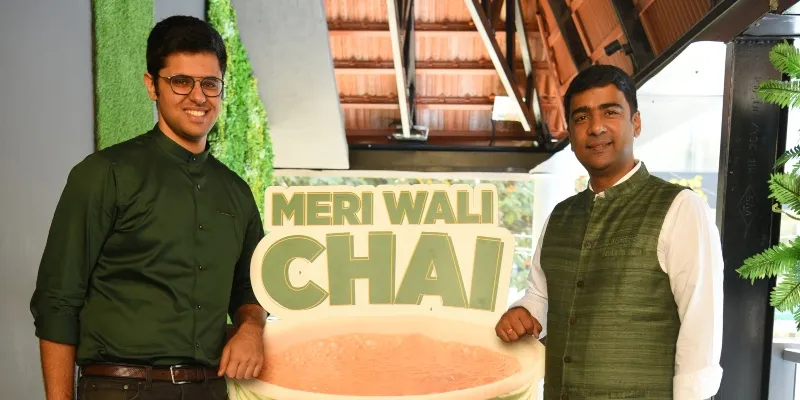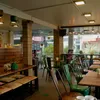Seven years and 65 stores later, Chaayos launches its first outlet in Bengaluru
Delhi-based Chaayos has opened three stores in Bengaluru to mark seven years of starting up. The startup, which is betting strongly on technology to ensure customisation and customer satisfaction, aims to capture the Bengaluru market with 15 stores by the end of this financial year.
In 2012, IIT-Bombay alumnus Nitin Saluja and IIT-Delhi alumnus Raghav Verma realised that India may be a predominately chai-drinking nation, but it had more cafes for coffee than tea. Starting up wasn’t as glamorous back then, but the duo, who felt that a roadside tapri did not work as a good chai outlet, decided to launch Chaayos, a chai startup.
In seven years, Chaayos has grown to 65 stores across Delhi, Noida, Gurugram, Faridabad, Chandigarh, and Mumbai. The founding duo celebrated the startup’s seventh birthday by opening their first outlet in Bengaluru.
Chaayos has till now raised $18.5 million across four rounds of investment. In September last year, it raised Rs 81 crore in Series B funding led by SAIF Partners. Its investors include the likes of Tiger Global Management, SAIF Partners, and Integrated Capital.
The startup’s closest competitor, Chai Point, has raised $37.5 million across seven rounds of funding.

Founders of Chaayos - Raghav Verma and Nitin Saluja (Left to Right)
A late entrant to the Bengaluru market?
The founding duo strongly believe in Chaayos’ value proposition and is relatively unfazed by the competition. On Tuesday, Chaayos opened three cafes at Indiranagar, Phoenix Market City, and Park Square Mall simultaneously in Bengaluru.
The founders were at the opening of the Indiranagar 12th main outlet. A question that immediately came to mind was why did the tea brand take seven long years to launch its operations in Bengaluru? And did it lose customers to other competitors?
Raghav says, “Well, we are 15 years late into the cafe business itself. This is not a first-mover advantage kind of market. Yes, there are other chai players in the city today. But our USP is ‘Meri Wali Chai,’ fresh customised chai to your taste. We spoke to over 150 customers and did a lot of consumer research; and we realised that our value proposition still stood out. There is an ever-increasing demand for chai in the market”.
The Chaayos team at present comprises of 80 people, and the stores employ over 1,100 people.

Raghav Verma and Nitin Saluja
Building in customisation and scale
The brand has over 80,000 chai recipes with some unique recipes including Hari Mirch Chai, Aam Papad Chai, and others. “We even experimented with Hajmola chai, but we discontinued the flavour,” Nitin says.
According to the core team, the business has “always been about density”. It is largely an impulse business and access to customer is the main aim, which is why the idea is to go deep first before going broad.
“The idea is to first establish a critical mass,” Raghav explains. The core idea of Chaayos is to give the chai-loving Indian customisable quality and consistent-tasting tea.
Each consumer has his or own taste preferences, but consistency is what brings the consumer back. However, consistent-tasting chai that is customisable and made at scale is a tough problem statement.
What helped the team achieve scale was building a tech layer with Chai Monk, their IoT-enabled bot platform. Chai Monks are integrated at the point-of-sale through the cloud, which takes orders and makes the tea without human intervention.
“The customer can give their specification and order at the point of sale. For example, if a customer orders Adrak-Tulsi Chai, with less milk and no sugar, the IoT platform reads the order, and the stipulated amount - less milk, more water - is added. The right temperature is also pre-defined,” Nitin says.
Each recipe has a pre-defined loop. Since it is cloud and IoT-enabled, Chai Monk will even give the manager immediate feedback if the combinations are distorted. In such a case, the tea gets replaced or discarded.
The team built this product in 2016.

The Chaayos Cafe at 12th Main Indiranagar, Bengaluru
Three years of understanding the market
For the first four years, the duo focused on building the base and understanding the market. Nitin was the cafe manager for the first store, and Raghav was the cafe manager for the second one.
“In every transaction, you have three opportunities for mistakes - you mess with the conversation, chai, or you don’t have a nice looking place. All of these are great learnings as well,” Nitin says. This is where the duo learnt the business. Nitin says they did everything from taking orders, feedback, making the chai, and other details.
The founding team had angel investment to build the outlet. The duo recalls that early employees took over 35 days to understand one single set of customisation and requirement.
“Everyone asked who would come to a cafe for chai? When we proved our model in the business park, we decided to work across different formats. The first three years were about proving to ourselves that this was a format that could work across different real estate locations and centres,” Raghav says.
The duo began with tasting and blending themselves. Not being from the industry helped, as being outsiders, they thought of different permutations and combinations of teas. They say they didn’t want to be influenced by what experts had to say.
Chaayos is now present in high streets, malls, business parks, hospitals, educational institutions, metros, and airports.
“When you make those mistakes early on, you are getting ready to scale fast with lesser mistakes and failures,” Raghav says. Until 2015, the duo spoke to every cafe, store, restaurant manager, CEOs of food brands and companies, and vendors (to understand where they had source their products and raw material).
“Our vegetable and poultry supplier who we on-boarded in our early days is still one of our suppliers,” Nitin says.
It was in 2015 that the team started exploring the online market, which now contributes 20 percent of the overall business.
The team began hiring experts after the first two store launches to help build the scale. By 2015, the team had six stores and was making Rs 50 lakh revenue per month. It was then Chaayos raised its Series A funding. During this period, they also worked on the food menu.
In the early days, food contributed 35 percent towards the overall business, and today it contributes close to 50 percent.
The founders hired some of their early employees like Vinod Rathore to run their third and fourth store. Vinod incidentally is still a part of Chaayos.
It was only after three years of operations that the team opened an outlet in Mumbai and then in Chandigarh.
“But we learnt from Mumbai that to create network effects in the city, you need to open multiple stores; this is the learning we bring to Bengaluru now,” Nitin says.
Building the tech
In 2015, the team begin working on the tech product to focus on consistency. The tech has two core agendas: make the customer happier and make the life of the cafe manager less mundane. They began with building the point-of-sale, and the real-time supply chain management module, and finally the Chai Monks.
The Chai Monks emerged with a problem statement from their own outlet. The duo had gone to one of their outlets in Delhi, where they saw over 20 vada pavs that were going to expire. “Everything is done fresh in our kitchens,” Nitin says.
They felt there needed to be a way to get Chaayos’ top Vada Pav customers to the store by offering them a discount and liquidating the inventor. Thus, the problem statement had three points - point of scale, CRM, and supply chain management. They had to build a PoS that could capture customer details and dynamically generate an offer for them and know the real-time inventory at every store.
This is the entire tech stack of Chaayos. From the time the tea leaves hit the warehouse to the time the consumer has the chai, there is track of every single step.
Today, when a consumer walks into a Chaayos store, the person who takes the order gives them the option and choice of different milk levels, different spices (12 spices), sugar levels, and the kind of tea s/he wants.
However, the first decision-making is guided. If the consumer doesn’t like it, zero questions are asked, and the team gives the customer the tea s/he wants. Nitin says, even with this the wastage is the lowest in the industry. He says it is about half percent wastage on their revenue.
Chaayos claims revenue growth of 70 percent year-on-year. The team claims to be profitable on their cafe network level and is breaking even on a company level.
What does the future hold? “We are looking at adding five more cities, and doubling down on our technology. That is what us going to give us more scale,” the founders say.
(Edited by Teja Lele Desai)










